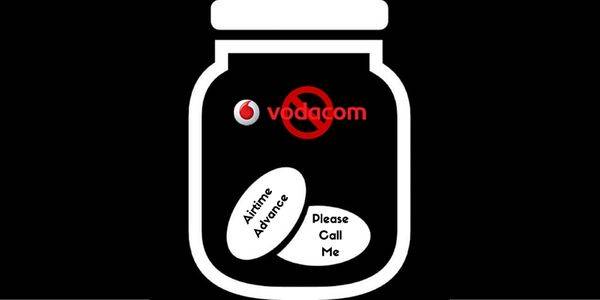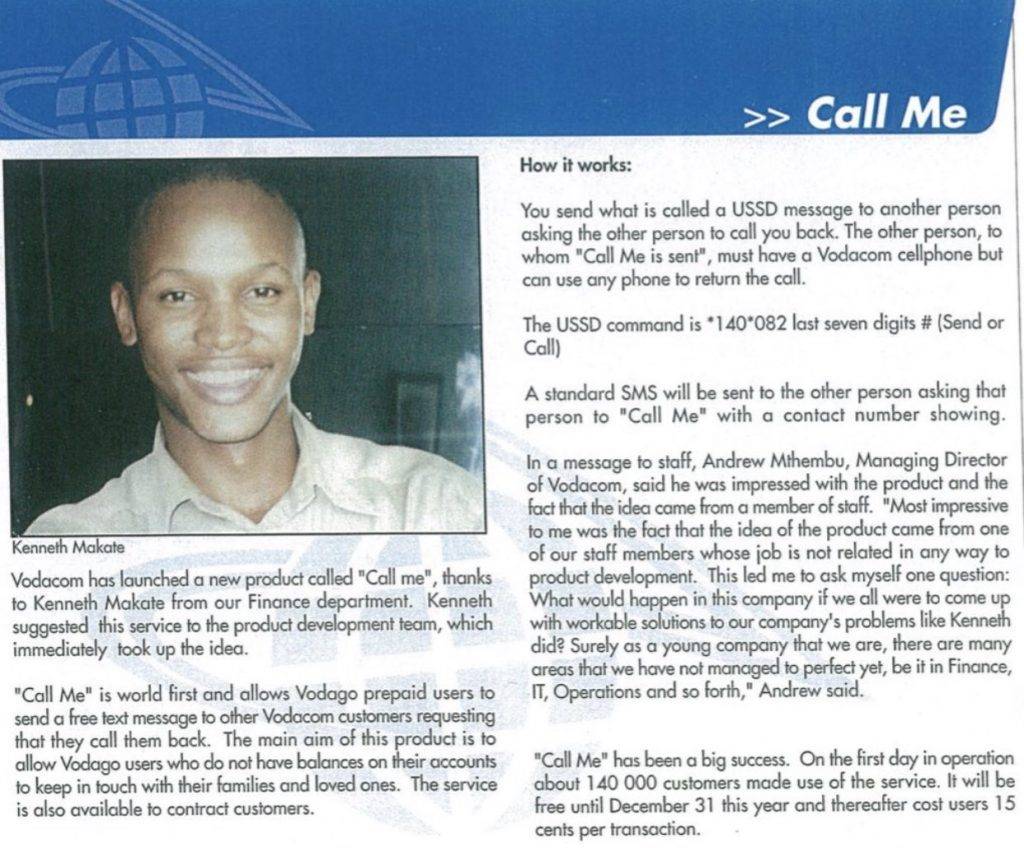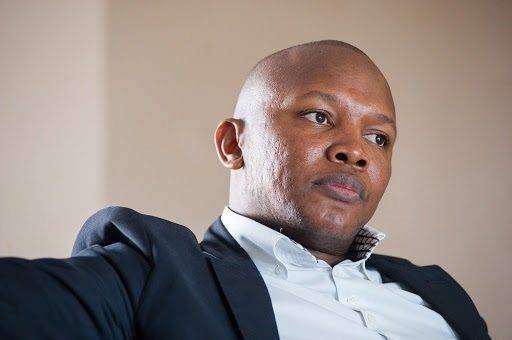‘Please Call Me’ Put Vodacom In A Messy 20-Year Fight That Drags On

At the turn of the century, Kenneth Nkosana Makate, 23 at the time, was just another young unremarkable Trainee Accountant in the Finance Department of Vodacom – a telco that had launched in South Africa in 1993 and is now a market leader.
By November 2000, at a time when mobile telephony was still in its early phases, Makate came up with an idea that was pretty much inspired by romantic interests. At the time, he was in a long-distance relationship with a student that eventually became his wife and still is.
And back then, keeping in touch was quite challenging. If a person needed to get in touch with someone urgently and didn’t have airtime or the means to get airtime, they were pretty much handicapped.
But necessity, or in this case affection, is the mother of invention. So, in the year 2000, Makate conceived an idea, took it to the product team at Vodacom, and everyone loved it! That’s how the “Please Call Me” service was born.
In fact, Makate is celebrated as some sort of genius; the “inventor of Please Call Me,” he is called. In a newsletter released by Vodacom in those early days, Makate was lauded and credited for the idea, and also talked up as a glowing example of ingenuity coming from the unlikeliest of places.

Source: Kenneth Nkosana Makate/Twitter
Although it’s not the incredibly popular, helpful, and indispensable service that it once was, most people would remember “Please Call Me” as a service that enabled mobile subscribers who had insufficient balances to prompt other people to give them a call. By dialing a simple code with the recipient’s phone number, the sender could essentially send a “call me” text message even without airtime.
It became a hit immediately after launching, such that many other telcos in Africa launched their own versions of the service.
In those early days, Vodacom did reveal that 140,000 customers used the service on the first day of operation. Although it was completely free at first, Vodacom eventually began to charge 15 cents per transaction. The ‘Please Call Me’ idea was a winner for a long time.
However, no one could have envisaged that this same pleasant creation will be the flashpoint of a nasty fight that seems to have no end; a protracted messy battle that has raged on for 20 years and counting.
Long story short, Makate and Vodacom have been trading tackles for the better part of the past two decades.
On one hand, there is a now-44-year-old Makate seeking huge compensation (more than ZAR 10 Bn or around USD 717 Mn) for his idea. On the other hand, there is one of the biggest telcos in Africa, Vodacom, which is only willing to offer ZAR 47 Mn (about USD 3.4 Mn) to Makate as compensation, but that was only after their attempt at discrediting him failed.
It’s been reported that upon launching the Please Call Me Service, Vodacom made promises to Makate that can be summed as “we are going to give you a proportion of what we make from the service.” Some other reports put that proportion at “5 percent of the proceeds generated from his invention.”
But apparently, it didn’t turn out that way. In fact, at some point, a former CEO of Vodacom, Alan Knott-Craig, claimed the Please Call Me idea was his, not Makate’s. So Makate, who left the company long ago, decided to seek what he thought was rightfully his.
After attempts by Makate to negotiate with Vodacom on his compensation were rebuked, he turned to the courts. Over a period of 8 years, the case dragged on. A 2014 judgment in the South Gauteng High Court supported Makate’s claim to having originated Please Call Me. It also rejected former CEO Alan Knott-Craig’s claim that he had come up with the idea of the messaging service.
Still, the High Court ruled against Makate, holding that the then Head of Product, Phillip Geissler, had not had the authority to promise Makate such compensation and that the debt would have expired (in legal terms, been prescribed) within three years.
That was just one of the many twists in the tale. As it turned out, Makate appealed the case, and later took it to the Constitutional Court. In April 2016, Justice Chris Jafta ruled in Makate’s favour and against Vodacom.
That ruling dictated that Vodacom enter into negotiations with Makate with a view to finding fair compensation. After initially dragging its feet and trying to appeal the ruling without success, Vodacom, through its CEO, Shameel Joosub, crunched some numbers and arrived at ZAR 47 Mn. But that’s not a number Makate is happy with.

Source: SouthAfrica.com
Hence, the battle continues. In the latest installment of the saga, Makate, through his legal counsel, is faulting Vodacom’s calculations, describing the negotiations with Vodacom as “not transparent enough.”
His demands? Something north of ZAR 10 Bn, without even accounting for accrued interest and all the legal fees incurred since the Constitutional Court judgment of 2016. Indeed, Makate is seeking a resolution that will compel Vodacom to pay him a settlement that takes into account his legal fees.
The Gauteng High Court, Pretoria, is presiding over Makate’s review application in which he is asking that the ZAR 47 Mn which Vodacom claimed is owed to him be reviewed and set aside.
Makate’s wing sought a redress that will compel the telco to release financial records, which will assist the parties in determining the value of the Please Call Me idea, and the High Court in Pretoria agreed, and last June, justice Jody Kollapen granted the order. At the time, Vodacom resolved to review the judgment and take the appropriate next steps.
As it is, Makate and his legal team have determined and argued that Please Call Me earned Vodacom ZAR 205 Bn (USD 14.6 Bn) in call revenue from 2001 to 2020 (a forecast), which excludes, among other things, advertising revenue linked to the innovation.
They are seeking compensation based on these calculations. But this in itself constitutes another point of disagreement as both sides are far apart on the subject of what constitutes revenue generated from the invention.
On the other side, Vodacom maintains that the service generated no revenue but they are willing to make concessions and reward Makate for his idea based on the calculations of the CEO which they say is “honest” and “in good faith.”
The Please Call Me service may have slipped into obscurity years ago but it remains the subject of a heated dispute to this day – one that might bring a substantial windfall for some and a big loss for others.
At the moment, it is understood that the case lies on the table of Gauteng High Court, Pretoria, which is expected to make a call that may finally put an end to this protracted squabble.
Featured Image Courtesy: AfricanTechRoundup